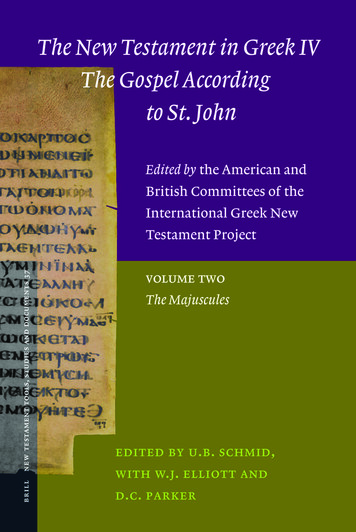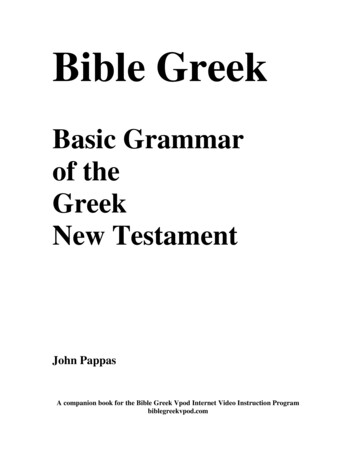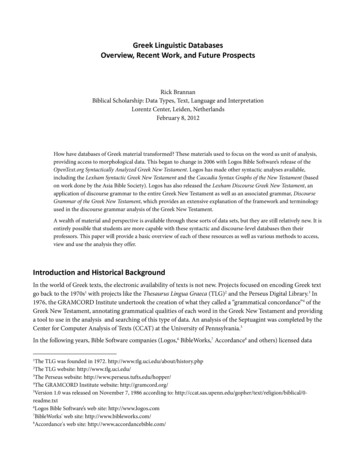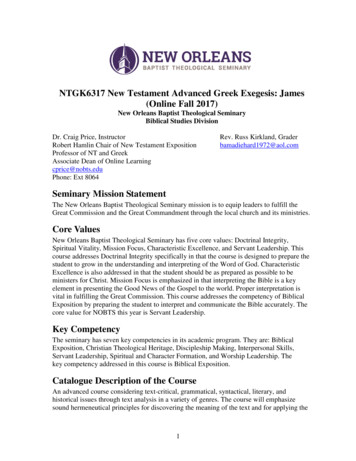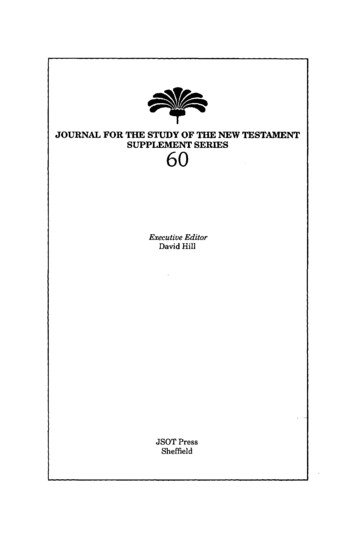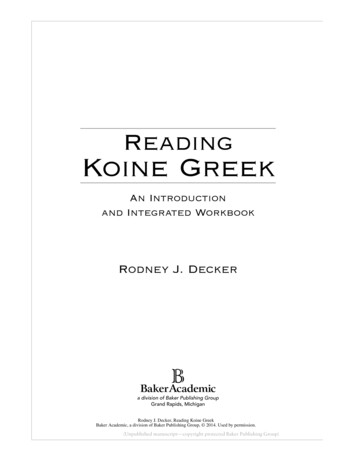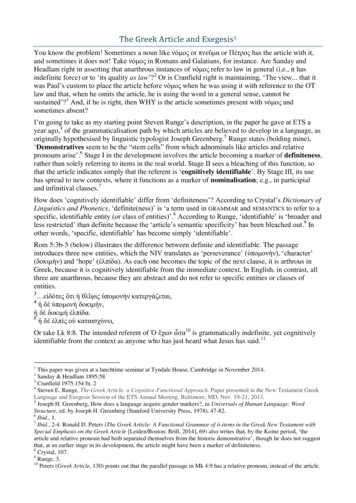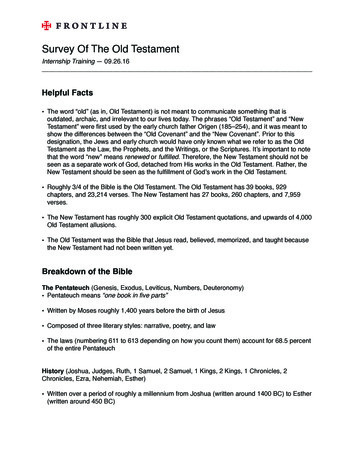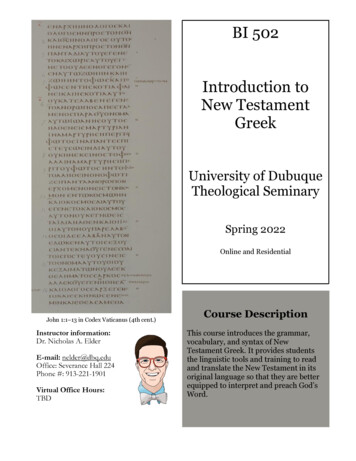
Transcription
BI 502Introduction toNew TestamentGreekUniversity of DubuqueTheological SeminarySpring 2022Online and ResidentialJohn 1:1–13 in Codex Vaticanus (4th cent.)Instructor information:Dr. Nicholas A. ElderE-mail: nelder@dbq.eduOffice: Severance Hall 224Phone #: 913-221-1901Virtual Office Hours:TBDCourse DescriptionThis course introduces the grammar,vocabulary, and syntax of NewTestament Greek. It provides studentsthe linguistic tools and training to readand translate the New Testament in itsoriginal language so that they are betterequipped to interpret and preach God’sWord.
Course Outcomes and Curricular ObjectivesStudents who successfully complete this course will:#1: Be able type in Greek unicode.#2: Be able to translate passages of easy-to-moderate difficultyfrom the Greek New Testament.#3: Be able to sight read passages of easy difficulty from theGreek New Testament silently and aloud.#4: Have memorized vocabulary of words occurring 50 ormore times in the Greek New Testament.#5: Recognize and be able to parse different verbal and nominalforms of Greek words and thus understand the functions of thedifferent Greek moods, voices, tenses, and cases.This course supports the following curricular objectives: Be formed by, live in, and minister out of scripture and the historical and theological tradition of thechurch (MDiv) Interpret the Christian Scriptures through faithful exegesis and in light of the Christian tradition(MDiv) Preach the Word of God with faithfulness and clarity (MDiv) Articulate and reflect critically and constructively on the biblical and theological foundations of God’smission to the world (MAMD) Be able to identify and interpret key themes from the Christian scriptures (MACL)
Required “Texts”David Alan Black, Learn toRead New Testament Greek,3rd edition (B&H Academic,2009) ISBN: 0805444939BrainScapeFor this class I ask that you study vocabulary usingBrainScape smart flashcards. BrainScape is a freeprogram that has a web-based and mobile application.The link for our course’s content is available here. Itmight seem odd (and somewhat Draconian) that Irequire you to study in a specific way, but there areseveral reasons that I ask you to use this particular tool.First, it uses algorithms and cognitive brain science tomaximize your study time. Information you know wellshows up less often than information that you do notknow well. If you use this tool regularly, you will knowGreek vocabulary much better than if you do not.Second, it allows me to create flashcards for you. Whilethere are many benefits to creating your own flashcards,having them created for you takes a cognitive and timeload off. It also insures a level of “quality control” overthe flashcards. Third, it allows me to track not only eachstudent’s learning progress, but the class’s progresscollectively. If there is an area that the entire class isstruggling with, BrainScape makes that clear on thebasis of analytics. Fourth, it is a tool that I hope will behelpful for you in other classes, as you can create yourown decks with the software.All said, BrainScape is a free tool that is ultimatelymeant to support your learning.UBS 5th Revised Greek NewTestament Reader’s Edition(German Bible Society, 2015)Dry-Erase BoardI ask that you purchase a smalldry-erase board for this class.This will facilitate the study ofGreek verb and noun paradigms.Cognitive studies show thatphysical writing aidsmemorization. Repeatedlywriting Greek paradigms in yourstudy will improve your ability tosucceed on quizzes, the class,and ultimately read NewTestament Greek.
Strongly Recommended TextsPossessing the following texts will not be necessary to complete the requirements for thiscourse. However, they will be helpful not only for the course, but especially for furtherstudy of Greek. Even if you do not intend to take subsequent Greek language courses, youwill find these resources to be helpful in your personal study and ministry. They are someof the “essential” Greek resources that might be required in a second-semester or secondyear Greek course.A Short Greek LexiconThe reader’s edition of the Greek New Testament requiredfor this class contains a a dictionary or “lexicon” at the backof it, but it is very abridged. Having a stand-alone lexicon isvery helpful for translating. I recommend one of these two: Thayer’s Greek-English Lexicon of the New Testament 24 on Amazon Liddell and Scott’s Abridged Greek-English Lexicon 28 on AmazonKyle Greenwood, Dictionary of English Grammar forStudents of Biblical Languages (Grand Rapids: ZondervanAcademic, 2020).One of the roadblocks to learning biblical languages is unfamiliaritywith English grammatical terms and concepts. This handy littledictionary explains English, Greek, and Hebrew grammatical conceptsin an easy-to-understand way. 19 on Amazon.Walter Bauer and Frederick W. Danker et al., A GreekEnglish Lexicon of the New Testament and Other EarlyChristian Literature, 3d ed. (Chicago: University of ChicagoPress, 2000).Commonly referred to as BDAG, this is the best lexicon for NewTestament Greek. The price is steep, but serious Greek students willneed to own this eventually. It is one to keep an eye out for at usedbook stores. 135 on Amazon.
Specifications Grading and CategoriesThis class uses what is called specifications or "specs" grading. Final grades are not determined by thecollective score of weighted items. Rather, they are determined by the number of grade items that yousuccessfully complete. The rationale for using this grading system is that it removes much of the subjectivityof grading, restores rigor to academic work, and it is learning-outcome oriented.There are three different categories of grade items in this class: quizzes (grammar and vocabulary),homework, and exams.QuizzesThere is the possibility tocomplete two quizzes mostweeks of the semester. Onequiz each week is a grammar/paradigm quiz and one is avocabulary quiz. Vocabularyquizzes are cumulative, butfocus on the material from theprevious week. Grammarquizzes are not cumulative;they only cover material fromthe previous week.To complete a quizsuccessfully, you must take itby Tuesday at 11:59 PM (CST),earn at least an 85% on it, andnot utilize any outsideresources. Quizzes can beretaken until an 85% isachieved, but the questions arerandomized. That is, questionswill not necessarily be exactlythe same, nor will they be inthe same order. Questionsanswered incorrectly will beindicated, but the answers tothose questions will not begiven.HomeworkThere is the possibility tocomplete two homeworkassignments each week of thesemester. These will besubmitted to a discussionforum and/or a dropbox(depending on the week).These assignments are basedon the exercises at the end eachchapter in Black’s grammar buthave been amended by theprofessor. Often they requirewritten engagement pairedwith audio or videoengagement.To complete a homeworkassignment successfully, youmust submit it by 2:30 PM(CST) on Monday. In addition,you either need to attend aweekly Zoom meeting in whichthe assignments are discussedor submit a version of it that isself-corrected on the basis ofthe answer materials providedin Moodle.ExamsThere is the possibility tocomplete three examsthroughout the course of thesemester. The first and thirdexams are “translation exams.”These require that youtranslate several Greeksentences and answeraccompanying grammaticalquestions about them. Bothtranslation exams are openbook, open-note, and untimed.To pass these exams, you mustreceive an 85% on them. Theseexams can be retaken with theuse of a grace token.The second exam is acumulative vocabulary examdue in Week Twelve of thecourse. It covers all thevocabulary words covered tothat point in the semester. It isclosed-book, closed-note, andtimed. This exam can beretaken until an 85% isachieved, but the questions arerandomized. That is, questionswill not necessarily be exactlythe same, nor will they be inthe same order.
Final Grade Specifications RequirementsTo earn a specific letter grade, you must complete the minimum number of items in each of thecategories. The minimum number you complete in any category will ultimately determine your finalgrade. For example, if you completed the 24 homework assignments required for an “A” and the 3exam requirements for an “A,” but only completed 23 quizzes, which is the minimum requirement foran “A-”, then your final grade would be an “A-” not an “A.”Quizzes(26 Total Items)Homework(26 Total Items)Exams(3 Total Items)A24243A-23233B 22223B21213Letter Grade“The BGuarantee”If a student attempts every grade item in the class on time, even if they do notpass each item, they are guaranteed a “B” for the course.B-20202C 19192C18182C-17172D 16162D15151D-14141F0–130–130Grace Tokens: Every student receives three “grace tokens” that can be used at anytime during the course. These “grace tokens” can be redeemed for any of the followingwith no explanation needed: Credit for a quiz that was not completed or was not passed at 85%. Credit for a homework assignment that was not completed. The opportunity to correct wrong answers on a translation exam that was not passedat 85%. The incorrect answers will be noted on the exam, but the correct answers notprovided by the professor. The revised work can be done open-book and open-note.
Course ScheduleGreek is difficult and therefore this class is also difficult. Learning any language requires asignificant investment of time and mental energy. The good news is that if you put that time andenergy into this class you will be able to read the New Testament in the language that it was firstwritten by the end of the semester. Moreover, if you put in the time and energy that the courserequires you can and will succeed! If you complete the required assignments on time andspend 30 minutes a day reviewing flashcards, the class is structured so that you will not fail it.That said, you should expect to devote significant time and energy to this class throughout yourweek. Learning a language happens best in small, daily chunks rather by cramming study sessionsinto one or two days per week. My policy for the course is that if you attempt every grade item(quizzes, assignments, exams) on time, even if you do not pass every grade item, you will earn a“B” for the class.Recommended Weekly dayParticipate in Zoom Meeting or Correct Homework1.5 hoursReview Flashcards and Practice Paradigms on Dry-erase Board30 minutesTake Vocabulary and Grammar Quizzes30 minutesRead First Chapter and Watch First Lecturette1 hourReview Flashcards and Practice Paradigms on Dry-erase Board30 minutesReview Flashcards and Practice Paradigms on Dry-erase Board30 minutesComplete First Homework Assignment1.5 hoursReview Flashcards and Practice Paradigms on Dry-erase Board30 minutesRead Lesson and Watch Lecturette1 hourReview Flashcards and Practice Paradigms on Dry-erase Board30 minutesComplete Second Homework Assignment1.5 hoursTotal time per week: 10 hours
Course Policies, Fine Print, Etc.Please Don’t CheatAll quizzes and one of the three exams for thisclass are closed book and closed note. Forhomework assignments, I will ask that you firstcomplete the assignment without reference tothe answer materials provided on Moodle andthen later self-correct your work.These policies are not meant to police you.Rather, they are meant to encourage deeperlearning, which happens when we attempt torecall information without a crutch. Making awrong guess on an assessment and latercorrecting it does more for learning thandoes immediately looking up the answer ifyou don’t know it.I have attempted to structure the class andits grade items in such a way that correctionis rewarded and mistakes on assessmentsdon’t penalize you in an irredeemable way.At the end of the day, I cannot control whatmaterials you access while completing thevarious grade items for the class. But I canask that you trust me and the assessmentmethods that I have worked hard to create.They are meant to support your learning.I do not anticipate that we will have anyissues of plagiarism or cheating. But shouldsuch serious issues arise, they will behandled in accordance with the seminary’spolicy on plagiarism, which can be found inthe UDTS handbook.Late WorkGetting behind in a language class isdetrimental to a student’s learning. This isparticularly the case in a one-semestercourse that must move at such a fast pace.For this reason quizzes and exams will closeat the times indicated and set in Moodleand will not be re-opened unless approvedby the professor.Automated Grading ErrorsThe quizzes and one of the exams in thisclass are automatically graded in Moodle.Automated grading sometimes results initems being marked wrong that may in factbe correct. I strongly advise that youdouble-check all questions that aremarked wrong. If you believe there wasan error in the automated please do nothesitate to contact me about it. I ammore than happy to take a look and changeit, if need be.If you happen to notice that something ismarked correct that should have beenmarked wrong, I’d like to know so that Ican fix the grading settings with respect tothat question. I will never go back andremove points from a grade item, though.That is: you will be doing me a favor if youcall attention to such an issue, and will notbe penalized for doing so.
Course Policies, Fine Print, Etc.Teaching PhilosophyAs a student, it can be helpful for your learning to know why your professors teach the way that they do.For this reason I am providing you with my teaching philosophy. If you ever have questions about whycontent is being taught in a certain way, I encourage you to ask me.As a theological educator, I aim to foster active learning environments that support and motivatestudents in their engagement with biblical, historical, and theological content.This vision depends on three principles that guide my teaching:(1) Learning is fundamentally a communal enterprise.(2) Learning is an active endeavor.(3) Learning requires consistent motivation, assessment, and feedback.Digital O"ce HoursI hold digital office hours on TBD. There is a Zoom link at the top of our course Moodle page for you toenter these office hours.These time frames are the most ideal for us to communicate synchronously. If you would like tocommunicate synchronously (by phone, course chat, or video conference) but these times don’t work foryour scheduled, send me an e-mail and we can set up a different day and/or time to do so.It is most ideal to discuss and correct homework during the synchronous meeting with several classmembers. If, however, those meeting times do not work for you or if you happen to miss them because ofa scheduling conflict, an office hours visit in which we discuss the assignment(s) will give you the samecredit as attending a synchronous meeting.
FAQWho are you?I'm glad you asked. I am Dr. Elder. I am originally from Kansas City, but also considerDenver, Milwaukee, and Dubuque home. I am the Assistant Professor of New Testament atUDTS. I did my PhD at Marquette University (Catholic, Jesuit), my MA at the Iliff School ofTheology (United Methodist), and my BA at Colorado Christian University (evangelical). I'mmarried to my better half, Beth, and we have four children: Brooks (age 9), Kit James (age6), and Lucy and Nettie (identical twins, age 3).How much time do you expect me to spend on this class?Per the Department of Education’s guidelines for credit hours, you should spendapproximately 152 hours total on a three-credit UDTS course. This works out to just over 10hours per week (including our “reading weeks” and finals week.) I have attempted to setthe schedule in such a way that you will usually be doing about 10 hours of work per weekon the class. Of course, some weeks will be heavier and some will be lighter.What are the virtual office hours?These are times that I specifically set aside for being available for synchronouscommunication with students. I will be available in the course Zoom during these times.This is not to say that I am not available at other times. But I dedicate these hours toanswering e-mails and communicating via other digital media.How should I contact you if I have a question about class?The first thing that you should do is consider the type of question that you have. If it isabout course content or a particular issue in an assignment then you should post it in the“Questions and Curiosities” forum for the week. That way, if another student has the samequestion, they will also acquire the answer to it. Also, if another student has an answer tothe question, they can offer it. This provides further opportunity to build community withinthe class. Even if another student answers the question (rightly or wrongly) I will answeryour question in that public forum so that others can see the information.If the question is of a more private or personal nature, you are free to e-mail me atnelder@dbq.edu, or we can talk digitally in another format.What should I call you?I prefer to be called Doctor Elder or Professor Elder.
Are the exams difficult?Two of the exams mimic the homework assignments, but are a bit longer. If you areconsistently completing the assignments and self-correcting them or attending thesynchronous meeting, you should not find these exams too difficult. If, however, you havenot kept up with course material, they will likely be difficult for you. They are not the kindsof exams for which you can simply cram. This is also true of the vocabulary exam. If youhave been keeping up with the vocabulary for the course, then you will likely find thevocabulary exam is fairly easy and will not take you much time.How can I best learn Greek?Learning a language happens best when you engage it on a daily basis. The best way tolearn Greek is to spend an hour or two every day on it, rather than trying to compress all ofthe work for a given week into two or three sessions.
from the Greek New Testament. #3: Be able to sight read passages of easy difficulty from the Greek New Testament silently and aloud. #4: Have memorized vocabulary of words occurring 50 or more times in the Greek New Testament. #5: Recognize and be able to parse different verbal and nominal forms of Greek words and thus understand the functions .

